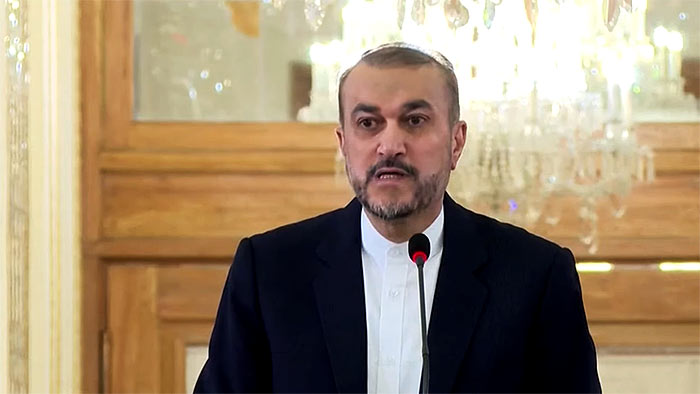Iran Claims It Warned of Attack on Israel; U.S. Denies Receiving Notice

Iran’s Foreign Minister, Hossein Amir-Abdollahian. (Photo: YouTube)
According to a Reuters report, Turkish, Jordanian, and Iraqi officials confirmed that Iran had issued a broad notification prior to its recent drone and missile strike on Israel, contrasting with U.S. claims that Washington received no prior warning.
The attack, which involved hundreds of drones and missiles, came in retaliation for a suspected Israeli strike on Iran’s embassy in Syria.
Most of the Iranian projectiles were intercepted, but the attack resulted in critical injuries to a young girl and sparked widespread fears of further escalation. Iran’s Foreign Minister, Hossein Amir-Abdollahian, stated that both neighboring countries and the United States were given a 72-hour notice of the impending strikes.
Turkey’s Foreign Ministry noted that it had communicated with both Washington and Tehran ahead of the attack, serving as a mediator to ensure that the response remained proportional. A Turkish diplomatic source mentioned, “Iran stated that the response would be in retaliation to the Israeli action in Damascus and would be contained within those bounds. We were prepared for possible developments.”
In the U.S., a senior official from President Joe Biden’s administration contradicted Amir-Abdollahian’s claims, stating that although there was indirect contact via Swiss intermediaries, the U.S. was not forewarned about the attack 72 hours in advance. “That is absolutely not true. There was no prior notification or any indication of specific targets,” the U.S. official asserted.
This official further revealed that the United States only received communication from Iran after the attack had begun, and the message indicated an intent to inflict substantial damage, suggesting the warning claims might be an effort to mitigate the perception of the attack’s limited impact.
Officials from Iraq, Turkey, and Jordan each reported that Iran had indeed provided early warnings about the attack, including some details about its nature.
The attack, utilizing drones, cruise missiles, and ballistic missiles, posed a significant risk of casualties and further escalation. On the days preceding the attack, U.S. officials expressed concerns about an imminent attack and strongly cautioned Iran against proceeding, with President Biden directly stating: “Don’t.”
Details emerged from two Iraqi sources, who stated that Iran had used diplomatic channels to inform Baghdad of the attack at least three days prior, with specific information passed to Iraqi security and military authorities just hours before the strikes. This allowed Baghdad to close its airspace timely, avoiding potential tragedies. An Iraqi security official added that the U.S. military in Iraq was presumed to be aware of the impending attack.
A senior Jordanian official disclosed that Iran had convened Arab envoys in Tehran to announce its plans on Wednesday, though it did not specify the exact timing of the attack.
Regarding the U.S.’s position, an Iranian source indicated that Iran had communicated through various diplomatic channels, including Qatar, Turkey, and Switzerland, about the planned day of the attack, aiming to avoid provoking any reaction.
The possibility of escalation remains uncertain. President Biden has assured Israel that the U.S. will not participate in any retaliatory action. However, Israeli Minister Benny Gantz stated on Sunday that Israel would respond to Iran “in the fashion and timing that is right for us,” indicating ongoing deliberations on how best to address the situation.
Latest Headlines in Sri Lanka
- Six police officers arrested over alleged priest assault granted bail January 29, 2026
- Sri Lanka moves toward ‘Dream School’ system for all grades January 29, 2026
- ASP Rohan Olugala appointed Director of Walana Anti Corruption Unit January 29, 2026
- Sri Lanka launches five-year national action plan to combat human trafficking January 29, 2026
- Équité launches media guidelines to protect LGBTIQ+ rights in Sri Lanka January 28, 2026


